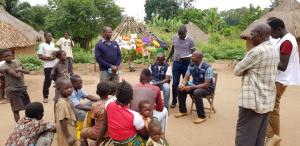WHO in collaboration with the Ministry of Health and partners intensifies the health response to the yellow fever epidemic in Gbudue State, South Sudan
Juba, 1 December 2018 – Despite the ongoing complex humanitarian crises in South Sudan, the World Health Organization (WHO) in partnership with the Ministry of Health and partners responding to the yellow fever outbreak in Gbudue State.
Following the declaration of the Yellow Fever outbreak on 29 November 2018, WHO deployed a multidisciplinary team of experts to undertake an in-depth epidemiological; entomological; and laboratory investigations from 1 to 8 December 2018.
The team comprising of epidemiologists, a public health officer, entomologists; laboratory specialists as well as risk communication experts are carrying out an analysis of the situation to determine the magnitude of the current outbreak, the size of the population at risk, identify factors for disease transmission and propagation, and initiate control measles to prevent further spread of the disease.
Yellow fever is a viral disease, transmitted via bites of infected mosquitoes, that has caused large epidemics in Africa and the Americas. Its effects range from mild symptoms to severe illness and death. The "yellow" in the name is explained by jaundice that affects some patients. Although an effective vaccine has been available for 60 years, yellow fever is still a serious public health threat.
Given the overall situation in South Sudan, containing the outbreak at an early stage is critical to avoid the spread of the disease, said Mr Evans Liyosi, the Officer in Charge of WHO South Sudan. The failure to control the outbreak could have immense public health consequences, straining the overstretched capacity of health services and resulting in an increase in illness and death.
As part of the elimination of yellow fever epidemics strategy (EYE), the Ministry of Health in collaboration with WHO and partners have planned to introduce yellow fever into the routine immunization schedule.
“Yellow fever vaccination is mandated by the International Health Regulations (IHR 2005) for international travelers”, said Mr Liyosi. There is a need to ensure that all citizens obtain yellow fever vaccination when traveling to countries where yellow fever vaccination is required in order to prevent the international spread as it happened in 2016. In 2016, yellow fever resurged in Angola to become the largest yellow fever outbreak on record over the last 30 years.
Enhancing point of entry IHR core capacities is essential to ensure that incoming travelers from yellow fever endemic countries carry a valid international certificate of vaccination as proof of yellow fever vaccination.
WHO with funding from the European Civil Protection and Humanitarian Aid Operations (ECHO) and the United States Agency for International Development (USAID) has been supporting the prevention and treatment efforts of communicable disease through provision of supplies, strengthening disease surveillance and comprehensive disease investigation, training community health workers to conduct outreach activities on prevention and control, as well as supporting social mobilization and community engagement activities.
South Sudan experienced a yellow fever outbreak in May 2003, in Imatong region of Torit County, with a total of 178 cases with 27 deaths (CFR 15%) in Imatong and Ikotos districts, Torit County.




